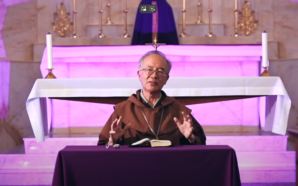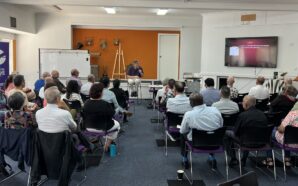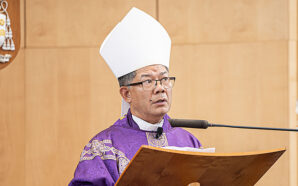Homily for the 19th Sunday in Ordinary Time Year C
Readings: Wisdom 18:6-9; Psalm 32; Hebrews 11:1-2,8-19; Luke 12:32-48
7 August 2022
Things seem to be reaching a breaking point in Germany where the bishops have been conducting long term consultations with Catholics invoking Pope Francis’s commitment to the Synodal Way. On 21 July 2022, the Holy See issued an unsigned statement warning: ‘The “Synodal Way” in Germany does not have the power to compel bishops and the faithful to adopt new forms of governance and new orientations of doctrine and morals’. The Vatican warned: ‘It would not be permissible to introduce new official structures or doctrines in dioceses before an agreement had been reached at the level of the universal Church, which would constitute a violation of ecclesial communion and a threat to the unity of the Church.’[1]
Listen at https://soundcloud.com/frank-brennan-6/homily-7822
On Friday the German Bishops’ Conference published the document which obviously prompted the Vatican Curia’s pre-emptive strike two weeks before. The document entitled For a synodal Church – community, participation and mission is the report of the German Bishops’ Conference to the World Synod of Bishops 2023.[2]
With Sunday Mass attendance in Germany falling from 37.5% in 1970 to 10% in 2019, the bishops are providing feedback from the 27 German dioceses on 10 discrete topics, noting: ‘The number of faithful in the dioceses who took part in the survey for the World Synod of Bishops is in the bottom single-digit percentage range. The dioceses nonetheless note that all groups of committed faithful are represented: women and men, clergy and laity, full-timers and voluntary workers, young and old. That having been said, it was virtually impossible to get any disenchanted and unchurched people involved.’[3]
So the bishops have heard from the less than 10% of Catholics who are still rusted on. While noting that many of these Catholics would like the church in Germany to be more outspoken on critical issues such as ‘climate change, social justice, human dignity, poverty and migration, war and peace’, the German bishops note:
‘But the words are only credible if they correspond to conduct as an individual and as a Church. There is often talk of a profound ashamedness when it comes to confessing and speaking out as a Christian in the secular sphere because of the massive scandals in the Church (sexual and sexualised violence against children and adults, abuse of power by priests and bishops, wasted money …).
‘Doubts are frequently voiced within the Church that an open discussion can take place in an atmosphere that is free of anxiety. There are taboo topics that cannot be discussed openly within the Church, especially questions related to sexuality (such as contraception, abortion, same-sex marriage…). Theologians are afraid of having their teaching licences revoked if they make nuanced, open statements. Lay people feel inferior to, and frequently not understood by, clerics and other people with a theological background in their ability to speak out and have their say.’[4]
These are very sobering observations. One might be tempted to despair for the future of the Church. It’s not that these matters are confined to Germany. The Germans may be just more upfront in admitting these things. Imagine if the bishops had got to hear from the ‘disenchanted and unchurched’ Catholics. These observations give substance to the declaration in today’s second reading from the letter to the Hebrews: ‘Only faith can guarantee the blessings that we hope for, or prove the existence of the realities that at present remain unseen. It was for faith that our ancestors were commended.’
Abraham set out for a new homeland, in faith, without knowing where he was going. ‘By faith he arrived, as a foreigner in the Promised Land, and lived there as if in a strange country.’ It was by faith that the elderly Sarah was able to conceive ‘because she believed that he who had made the promise would be faithful to it’.
Tomorrow we celebrate the feast of our only canonised Australian saint, Mary MacKillop. She can be an inspiration for us as we contemplate the state of our Church and the demands for charity, transparency and truth in times of conflict and profound change.
Our proud Australian boast is that our one canonised saint, unlike most others, was excommunicated for a time. Perhaps it’s the Australian sense of egalitarianism with a dash of anti-authoritarianism. Perhaps even a pinch of the larrikin.
Lawrence Bonaventure Sheil, Bishop of Adelaide, excommunicated Mary on 22 September 1871. The bishop was incensed because he wanted to amend the Rule of the newly established Sisters of St Joseph. He wanted ‘each convent to be entirely under the control of the local Pastor, with no central authority of the Institute’[5]. And of course, the local Pastors would be under the control of the bishop. So it was about power – and money. Mary’s independent sisters were soliciting funds for their poor schools from parishioners who were putting less of their earnings on the parish plate.
Mary asked to meet with the bishop. He would not hear of it. He sent a priest with the order that she leave town. A few hours later, the priestly messenger ‘returned to say that the Bishop excommunicated me for my disobedience and for being the ringleader of such’.
Four days later, Mary wrote to her guide and co-founder Fr Julian Tenison Woods reporting all that had happened. She reflected: ‘Don’t you see the protecting and beautiful hand of God in all that is happening? Oh never was I more tranquil and calm, and our loved Sisters the same. …We are all waiting, ready to go anywhere, under any circumstances, provided our Rule is not taken from us’.[6]
The bishop, surrounded by a bevy of clergy who had it in for the Sisters, remained resolute until his health failed and he was on his deathbed. So after five months of excommunication (during which time the Jesuits, believing the excommunication to be invalid, brought her communion,) Mary was allowed back in to the life and service of the local church. Mary wrote to her mother saying, ‘The poor bishop is indeed sorry for all now.’ She was all forgiving. She explained the situation to her mother:
‘Thanks be to God, the poor Bishop had true priests near at a time when he much needed them. Up to that time others were near. We will not speak of them, but it would be a charity to pray for some at least amongst them. I am thankful to say that there are very few of whom I have to speak in this way. The Bishop has acknowledged the injustice of his conduct to all, for priests, as well as Sisters, have been wronged, but God wisely permitted it for a hidden mysterious end.’[7]
One of the graces of Mary’s life was her capacity to make good out of evil and to learn from others’ mistakes. She had a resolute, simple faith, while being no one’s fool. She told her mother: ‘I feel that the events of the last few months have made me much older in many things. They have strengthened me for still weightier cares than I have yet had. At least I trust in God’s mercy and love that they have done me this good, which indeed I needed.’[8]
Eleven years later, Mary was put through the ringer once again, this time by the next Bishop of Adelaide, Christopher Augustine Reynolds. Reynolds falsely claimed to be in receipt of ‘letters of instruction from the Holy See…to hold Visitation of the Convents and examine into all matters, Spiritual and temporal’[9]. He had received no such instruction. Having concluded his self-generated investigation, Reynolds refused to meet with Mary, setting out a range of preposterous adverse findings, ordering her ‘to prepare at once to leave for Sydney, as you have no longer the confidence of the Sisterhood, nor is it in the interests of good order and of discipline, of peace or religion that you should remain in this Province.’[10]
Rather than calling out Reynolds as a liar, Mary wrote to her sisters saying, ‘God’s ways are most mysterious.’[11] Fr Paul Gardiner SJ who was a postulator for the cause of Mary Mackillop wrote in his book An Extraordinary Australian: Mary Mackillop: ‘Although the Bishop said several times just after the interrogations that a report had already been sent to Rome, the Roman officials denied that any such document ever reached them, just as they denied that they had ever authorised the Commission in the first place.’[12] Gardiner concluded: ‘After due allowance has been made for the mistakes of leading churchmen, for the pathetic mental state of the Bishop and for the possibly guiltless consciences of all, it is no service to the Christian or human cause to be mealy-mouthed about what happened in Adelaide in 1883. Mother Mary and the Sisters of Saint Joseph were the victims of gross breaches of justice and charity.’[13]
Let’s hope that there are, in neither the Vatican Curia nor the German hierarchy, bishops with the foibles, dishonesty and malice of Sheil and Reynolds. We could all do with a touch of the simple, resolute faith of Mary Mackillop in the months ahead as the intrigues play out between Rome and Bonn. It’s not just a German tussle. This is about the future of our Church seeking to proclaim Christ’s presence and the Spirit’s action in our contemporary world.
R: Blessed the people the Lord has chosen to be his own.
See, the eyes of the LORD are upon those who fear him,
upon those who hope for his kindness,
To deliver them from death
and preserve them in spite of famine.
R: Blessed the people the Lord has chosen to be his own.
Our soul waits for the LORD,
who is our help and our shield.
May your kindness, O LORD, be upon us
who have put our hope in you.
R: Blessed the people the Lord has chosen to be his own.
[1] See https://press.vatican.va/content/salastampa/it/bollettino/pubblico/2022/07/21/0550/01133.html#de. English translation of key sentences available at https://www.catholicnewsagency.com/news/251841/vatican-warns-of-threat-to-the-unity-germany-synodal-way
[2] German Bishops’ Conference, ‘For a synodal Church – community, participation and mission’, Press Release, 5 August 2022, available at https://www.dbk.de/fileadmin/redaktion/diverse_downloads/presse_2022/2022-114eng-Report-of-the-German-Bishops-Conference-to-the-World-Synod-of-Bishops-2023.pdf
[3] Ibid, p.2
[4] Ibid, p. 8
[5] Letter of Mary Mackillop to Julian Tenison Woods, 26 September 1871, in Sheila McCreanor, Mary Mackillop and a Nest of Crosses, Sisters of St Joseph, 2011, p. 272
[6] Ibid, pp. 274-5
[7] Letter of May Mackillop to her mother, Flora, 26 February 1872 at McCreanor, op. cit., p.361
[8] Ibid, p. 362
[9] Paul Gardiner, An Extraordinary Australian: Mary Mackillop, David Ell Publishing, 1993, p. 284
[10] Ibid, p. 299
[11] Ibid, p. 305
[12] Ibid, p. 286
[13] Ibid, p. 308
Fr Frank Brennan SJ is the Rector of Newman College, Melbourne, and the former CEO of Catholic Social Services Australia (CSSA). He was a peritus at the Fifth Plenary Council of the Australian Catholic Church.








